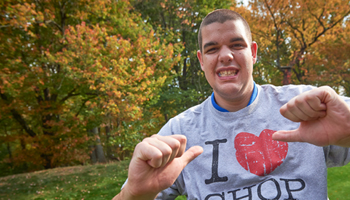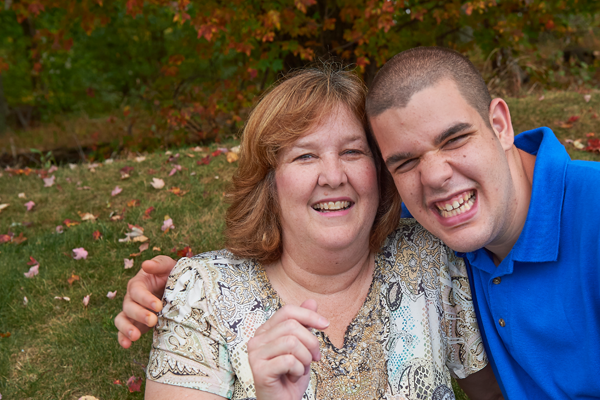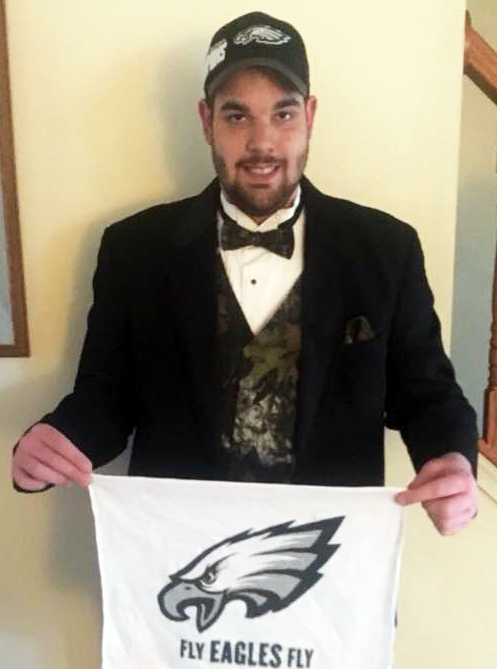HOW CAN WE HELP YOU? Call 1-800-TRY-CHOP
In This Section
Research Heroes: "Unique, Different, and Special": Ben Hartranft Speaks Up for Autism
 Nineteen-year-old Ben Hartranft remembers the first research study he participated in at the Center for Autism Research (CAR) nearly eight years ago. Though he was just 12, he didn’t feel nervous or scared about the functional magnetic resonance imaging machine that would capture images of his brain. Instead, Ben’s mom recalls him joking that the researchers could duct tape his legs to the chair to help him keep still (which, of course, wasn’t necessary).
Nineteen-year-old Ben Hartranft remembers the first research study he participated in at the Center for Autism Research (CAR) nearly eight years ago. Though he was just 12, he didn’t feel nervous or scared about the functional magnetic resonance imaging machine that would capture images of his brain. Instead, Ben’s mom recalls him joking that the researchers could duct tape his legs to the chair to help him keep still (which, of course, wasn’t necessary).
“I just stayed still, and it was very fun,” Ben said.
Six more research studies later, Ben’s volunteer work in CAR has helped our investigators at Children’s Hospital of Philadelphia discover valuable insights about autism spectrum disorder (ASD), from the impact of potential therapies for social anxiety, to brain-behavior associations, to the development of new technological interventions. And though Ben began the first two years of his life nonverbal — not responding to his name at 18 months old — today, he is an outgoing and well-loved inspiration within CAR and the wider Pennsylvania community. With a knack for public speaking and the friendly personality to match, Ben has made his mark as an advocate for autism research and awareness, most notably for his favorite team, the Philadelphia Eagles.
“I describe autism as unique, different, and special,” explained Ben, who received his ASD diagnosis at CHOP at age 2. “When I started doing research at CHOP, I really wanted to do more and give back more. Now I want to change the world by helping people understand autism. One in 68 people are diagnosed with autism, and every day, researchers are studying how they can help these children progress in life.”
Though investigators have come a long way in their understanding of ASD, there is still so much more to learn. Each individual on the spectrum is unique, and when participants and their families join research studies, they allow scientists to advance our knowledge of the many different facets and faces of autism.
“There’s a quote from Dr. Stephen Shore: ‘If you've met one person with autism, you’ve met one person with autism’ — and that’s what it truly is,” Ben said.
Jumping in to Advance Autism Research
After participating in his first study, Ben and his mom, Sandy, made sure to stay updated whenever CAR researchers called for volunteers. Over the years, Ben’s list of studies has grown to include a diverse range of interventions and ideas. There’s the social and motor functioning study, in which researchers used markerless motion capture technology to digitize the face and body movements of children with autism, a technology that could be used as a behavioral assessment tool for diagnosing ASD and to track an individual’s response to treatment over time.
Then there’s the oxytocin study, which addressed the challenge that many individuals with ASD encounter: recognizing faces and facial expressions. CAR researchers wanted to know whether oxytocin, in the form of a nasal spray, could help ease that challenge when paired with a computer game intervention designed to enhance face perception skills.
 “It was actually just really fascinating,” Sandy said. “The video games were really fun, and Ben had to play them for certain periods of time and try to figure out what emotions were on there.”
“It was actually just really fascinating,” Sandy said. “The video games were really fun, and Ben had to play them for certain periods of time and try to figure out what emotions were on there.”
Countless good memories have come out of these studies for the Hartranft family, including the simple joys of meeting the friendly faces of CAR. But for Sandy, participating in research had another benefit as a parent of a child on the spectrum.
“Initially, when your child is diagnosed, you spend a lot of time internally feeling like, ‘What could I have done differently?’” she said. “And then you come to the conclusion that that’s a lot of wasted energy. And you kind of turn in the other direction, and you say, ‘What can I do going forward?’ And that’s where the research has been such a blessing. You are like, ‘OK, I’m trying to make a difference for those coming behind us, and maybe they’ll even find something along the way that might benefit us, too.’”
Meanwhile, Ben wants individuals who might be hesitant to participate in research to know there’s nothing to fear.
“Communication is one tool that people need to have,” Ben said. “If you say, ‘I need a break,’ then you communicate that [to the researchers], and then they can do that.”
As for our CAR faculty, Ben’s enthusiastic participation and support for ASD research has left a big impression.
“The Center for Autism Research is extremely fortunate to have had Ben and his family participate in numerous studies over the years,” said Julia Parish Morris, PhD, a scientist in CAR who was recently featured on Philadelphia’s NBC10 along with Ben. “From basic gene-brain-behavior research to interventions that use innovative new technologies, Ben stays on the leading edge of scientific advancement at CHOP. Ben is dedicated to helping others and has the vision to see how contributing to the scientific enterprise achieves that goal. In addition to being a shining example of community participation, Ben is a truly wonderful person to know.”
Taking Flight for Autism
 Beyond participating in research, Ben lives his goal of supporting autism awareness every day. He was named an “autism ambassador” at his workplace, spoke at his first public speaking event earlier this month, and continues to share his celebratory accomplishments, like flying to Atlanta by himself to see his brother.
Beyond participating in research, Ben lives his goal of supporting autism awareness every day. He was named an “autism ambassador” at his workplace, spoke at his first public speaking event earlier this month, and continues to share his celebratory accomplishments, like flying to Atlanta by himself to see his brother.
This April, which marks Autism Awareness Month, Ben has already raised nearly $4,000 toward the upcoming Eagles Autism Challenge. Set for May 19, the Eagles Autism Challenge is a day-long event that will help to fund the types of research studies and clinical trials that Ben has participated in at CAR.
“A lot of people have donated, and I just wanted to thank those people,” Ben said.
Ultimately, Ben hopes to share his words of wisdom worldwide: “Having autism isn’t a bad thing, and it doesn’t characterize who you are. I’m looking for more opportunities to travel and go everywhere, go travel by myself, and tell my story to everyone around the world.”
Contribute to Ben’s Eagles Autism Challenge goal by making an online donation. Or join our Research Institute team as a walker, runner, or cyclist! Learn more about Ben’s ASD diagnosis.